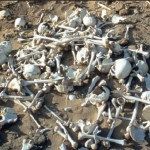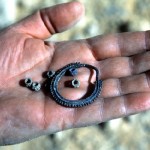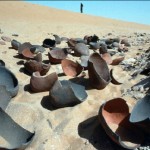 A pair of Italian archaeologists investigating the Sahara desert near Siwa in Egypt have uncovered hundreds of bleached bones, Bronze age weapons, arrowheads, jewelry, water pots and other artifacts dating to the 6th century B.C., right around the time when Persian king Cambyses II lost himself an army of 50,000 trying to destroy an oracle denying his right to rule a conquered Egypt.
A pair of Italian archaeologists investigating the Sahara desert near Siwa in Egypt have uncovered hundreds of bleached bones, Bronze age weapons, arrowheads, jewelry, water pots and other artifacts dating to the 6th century B.C., right around the time when Persian king Cambyses II lost himself an army of 50,000 trying to destroy an oracle denying his right to rule a conquered Egypt.
The earring and a bridle fitting look very much like carved images of Persian soldiers from the period. The bronze dagger fits the era and culture as well. These are unique finds.
 Herodutus (484-425 B.C.) wrote about Cambyses and his doomed campaign, felled by a sandstorm on the way to the oracle at the Temple of Amun near the Oasis of Siwa, but no physical evidence of the event has ever been found before. The desert doesn’t really get excavated a lot, for obvious reasons.
Herodutus (484-425 B.C.) wrote about Cambyses and his doomed campaign, felled by a sandstorm on the way to the oracle at the Temple of Amun near the Oasis of Siwa, but no physical evidence of the event has ever been found before. The desert doesn’t really get excavated a lot, for obvious reasons.
“It all started in 1996, during an expedition aimed at investigating the presence of iron meteorites near Bahrin, one small oasis not far from Siwa,” Alfredo Castiglioni, director of the Eastern Desert Research Center (CeRDO) in Varese, told Discovery News.
While working in the area, the researchers noticed a half-buried pot and some human remains. Then the brothers spotted something really intriguing — what could have been a natural shelter.
It was a rock about 35 meters (114.8 feet) long, 1.8 meters (5.9 feet) in height and 3 meters (9.8 feet) deep. Such natural formations occur in the desert, but this large rock was the only one in a large area.
“Its size and shape made it the perfect refuge in a sandstorm,” Castiglioni said.
Right there, the metal detector of Egyptian geologist Aly Barakat of Cairo University located relics of ancient warfare: a bronze dagger and several arrow tips.
“We are talking of small items, but they are extremely important as they are the first Achaemenid objects, thus dating to Cambyses’ time, which have emerged from the desert sands in a location quite close to Siwa,” Castiglioni said.
Cambyses was the son of Cyrus the Great. He took out his daddy issues on Egypt, which Cyrus had planned to invade but died before he got the chance. In 525 B.C., Cambyses defeated Pharaoh Psamtek III, the last king of the 26th Dynasty. Cambyses’ stint as the first pharaoh of Egypt’s 27th Dynasty ended 3 years later when he died on his way home to Persia.
 The sources on all this are thin, to say the least. Herodotus being a Greek had a tad of a bias against the Persians, what with the continual wars going on between them from the time of Cyrus the Great to a hundred years later when Herodotus was writing.
The sources on all this are thin, to say the least. Herodotus being a Greek had a tad of a bias against the Persians, what with the continual wars going on between them from the time of Cyrus the Great to a hundred years later when Herodotus was writing.
Cambyses’ failures may not actually have included his soldiers having to eat their dead comrades to survive in Nubia and losing a 50,000 man army in the desert.
Mohammed al-Saghir of Egypt’s Supreme Council of Antiquities is organizing another expedition to the site to investigate it more thoroughly. The desert sand can be a fine preserver of delicate items like textiles and leather. Whether these are the remains of Cambyses’ lost army, the kernel of truth behind the tale, or another thing altogether, any finds could tell us a huge amount about the military and political history of the time.
OK, that’s super fascinating. The desert is full of relics.
My favorite nickname for Herodotus is “the father of lies.” Still they were tales for people who would have been more in the know than we are now.
The desert is paydirt, to coin a phrase. I have day dreams sometimes about magically emptying deserts and lakes and walking around the secret ancient worlds within.
I usually go for “Herodotus the Liar”. It’s so succinct. :giggle:
I have those day dreams as well, but usually just about emptying lakes and oceans. The pyramids off the coast of Japan? Omg that’d be awesome! The exact same style of pyramid underwater in Bermuda? Omg again. Not to mention shipwrecks and such! Gaaaaaaaah. :angry:
And, yes, why not, Loch Ness with its zero water visibility. I’m fanciful at heart.
I think it’s a very interesting question whether they would have been more in the know than we are now. The idea that “closer to the events” amounts to “better informed about the events” certainly its appeal. But there’s also good reason to doubt that knowledge of events “tracks” temporal proximity to events in any tidy way, outside of a relatively short window. I.e., a month after the events might be much better information-wise than a hundred years later, but two thousand years later mightn’t be significantly worse than a hundred years. And in fact two thousand years later might be much better than a hundred years later, if much better methods of separating fact and fiction have been developed in the interim. I’m reading a lot about testimonial knowledge transmission these days, so this stuff is much on my mind.
It’s like how eye witness testimony of immediate events, compelling and “right” as it feels, often is dramatically wrong. The DNA tests done years after the crime can turn out to be far more reliable determiners of fact than our own eyes on the scene.
Of course, in the case of Herodotus and ancient sources in general, their testimony or the testimony they are relaying isn’t necessarily intended to be factual, so there’s an additional layer of complexity.
I’m in a Social Psychology class at the moment and after-the-fact recollections of events brings out all kinds of subconscious changes in us. Alot depends on who the individual is talking to, how many people are around at the time, and what sort of role they played in what went down. All those things will change the way a person views the story themselves, much less how much they will change it in the telling. This is my first psych class so I can’t pull any proper terminologies out of my can yet but veryveryvery interesting stuff nonetheless.
“certainly its appeal” s/b “certainly has its appeal”
I am Spanish and MBA student. I could not find any point in the comments I read from buddies. Obviously we are not obligated to comment archaeological discoveries.
The article is indicating an ancient event and a prove for Herodotus’s written history. Whatever we comment reveals how much I know about history and how much I respect to scientists and archaeologists who know far more than us. There might be a fact hardly to accept that a country and nation named currently Iran had been a super power. Lets read more and talk academically.
I didn’t mean that they would know more about events (gossip is universal), but they might be familiar with the locations talked about.
Event perception is at the whim of the perspective of the subjects.
what a jumble of bones. the wind? Or, dont ask, dont tell. looks contrived.